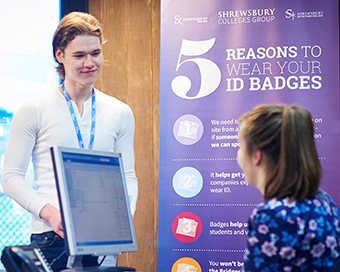As UCAS applications close and students begin preparing for life at university, many of you may not have chosen to apply and want to explore what’s available to you.
If this is the case, you have many choices and options to help support you in your future endeavours.
If you are still looking to go to university
If you did not apply for university through UCAS, or you did not meet the requisite UCAS points for your course, there are still multiple pathways to securing your place at university.
The Higher Education (HE) centre at the college, in association with Staffordshire university, provides a number of degree-level qualifications, as well as qualifications that act as pathways to university study, such as Higher Apprenticeships, Higher National Certificates (HNCs), and Higher National Diplomas (HNDs).
HNCs and HNDs have become a popular route for many. HNCs usually take one year of full-time study to complete, and HNDs typically take two years, though they can also be studied on a part-time basis to fit around any other commitments you may have. These courses, which cover a variety of sectors and industries, such as business, construction, management, music, and engineering, amongst others, act as equals to the first and second years of degrees, meaning that once you have completed your HND, you can go straight to the final year of a university course and be accredited with a full undergraduate degree.
Another reason for their popularity is the price; a fee for two years of study on an HNC and HND is typically around £3,000 cheaper than studying at university, which is before factoring in rental and accommodation costs, which can total around £6,000 P/A in some cities.
If you want to gain more experience before applying for full-time work
Again, HNCs and HNDs are not just a pathway to university. Unlike a degree, which requires completing all three years to obtain a qualification, you would achieve a qualification after year 1 (HNC) and years 2 & 3 (HND). So, if you are unsure about committing to a longer-term qualification, these provide that flexibility to decide if it is for you on a smaller timescale.
Alternatively, if you've completed A Levels or a Level 3 vocational course, you may be interested in a Higher-Level Apprenticeship. These offer the opportunity to gain quality training and a recognised higher-level qualification while in paid employment.
These qualifications are becoming increasingly popular, as the Level 5 apprenticeships are the equivalent of a foundation degree. As you would suspect, there is a significant level of work-related training in an apprenticeship which is focused on the industry and the business that you’re working for. You also have the added bonus of earning whilst you’re learning.
If you’re looking to expand your skills in a less formal setting, be it for work or simply out of interest, then there are a great deal of part-time courses available at the college. These can be fit around your employment, allowing you to learn a new skill or take up a new hobby. The full list of courses is available here: Part-time Courses (scg.ac.uk)
If you want to go straight into work
Write your CV if you haven’t already. You want your CV to stand out to employers and ensure that the relevant information is read by those involved in the hiring process. Here are some top tips for writing a CV:
- Use a template – this will ensure your CV is organised and structured efficiently
- Include a summary – in a few sentences, summarise your key attributes and what you are looking for from work
- Employment history – detail each job role or work experience that you have had, and use concise bullet points or sentences that detail your roles and responsibilities
- Education – start with your most recent qualifications and work your way back
- Include your skills & achievements – summarise the key skills you have gained through both your education and work roles
- Keep it simple – use modern, minimalist fonts. Do not overdo it and risk your CV looking tacky
- Don’t be generic – tailor your CV to the employer/employment sector. On occasion, I have used company colours in my CV theme when applying for hotly-contested roles
- Keep it up to date – applying with an out-of-date CV will look unprofessional and is a potential dealbreaker for employers
- Check for spelling errors – it is imperative that your CV is grammatically correct and does not include spelling errors. Avoid slang terminology and Americanisation’s of words (e.g. organisation, not organization)
If you want to stand out, it is essential to include a cover letter with your application. This will allow you to discuss in greater detail the points made in your CV and emphasise your suitability for the role. You can also demonstrate some of the knowledge you have gained about the company from your prior research.
It is important to make an account for yourself on apps and websites such as Indeed and LinkedIn. Indeed allows you to search available jobs in a given area, and by uploading your CV also allows for the application process to be made easier. LinkedIn is a networking application for professionals, which will enable you to research employees at a company and can potentially lead to recruitment opportunities, as many recruitment consultants use LinkedIn. Potential employers will check your LinkedIn, so ensure that it remains up to date.
Remember, there is no harm in chasing up an application if an employer has not got back to you. By calling direct, you are showing enthusiasm for the role. Even if the role in question is not something you are wholly interested in, it is important to show enthusiasm. If you have reached the interview stage, an employer has deemed you qualified and experienced enough to undertake the role in question; what they now want to know is whether you have the personality and enthusiasm to fit into the role and the team.








